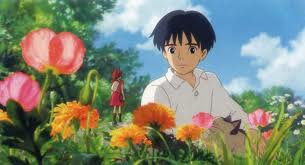
This is the 9th review I'll have written about a Studio Ghibli movie, but the first that I have seen in the theatre. We went along for to see the North American release of the 2009 movie, which has been dubbed in French and (British) English already. As a kid I really enjoyed the Borrowers books by Mary Norton, but I can't say any of the movies and tv shows based on the works impressed me much. So it was pleased to hear that Studio Ghibli were making the movie, and in fact the founders of the studio have been thinking about doing so for 40 years!
Borrowers, if you do not know, are 10cm tall people that live hidden in our houses, and get along by 'borrowing' things that we won't miss. Borrowers must never be seen, as once curious humans are dangerous, so once spotted they must uproot and move to a new home immediately. This movie takes the Borrowers story and relocates it in Japan, telling it the style of the many Ghibli movies before it.
The story begins when a young boy, Shō, is driven to the house in Tokyo his mother grew up in, to stay with his Great Aunt. While his Aunt goes into the house alone, he investigates the garden where a large (fat) cat is investigating a bush. The cat takes off and Shō catches a glimpse of our hero Arrietty as she slides down the stem of a flower and out of sight. Later that night we join Arrietty in the Borrowers home, as she prepares with her Father for her first dangerous journey up into the house to acquire sugar and tissue paper.

As with all Ghibli movies, the heroes are the children. The adults may be busy, sick, turned into pigs or just not give a damn, whilst the kids are independent, fearless and trying to grow up. In this movie the father is a strong yet silent type who obviously runs a tight ship with his family but is not afraid to let Arrietty grow up and take on dangerous work. The mother is more of a worrier, very comfortable in her little Borrower home and not wanting anything to change that. Of course Arrietty soon gets into adventure, or misadventure, with her parents nowhere to be seen.

Having seen a lot of animated movies aimed at kids recently, it was refreshing to watch one where the pace of the story was slow and thoughtful. Rather than being 90 minutes of action and drama, there is time for tension to build as the characters face increasing danger. There is time to watch amazingly animated beetles, centipedes and ants interact playfully with Arrietty, and for the sour faced fat house cat to play with Shō as he lies on the grass.That said there is plenty of action too, and the movie is never dull. It should appeal to most age groups.
The audio is notable, in that the sounds of everyday objects have been amplified and deepened in pitch so they become alien and scary when heard as if through the ears of the tiny people. I thought the soundtrack sounded like it was influenced by Irish or Spanish folk music, and really suits movie, but in fact was created by French musician Cécile Corbel. From Wikipedia:
"Corbel also performed the film's theme song, "Arrietty's Song", in Japanese, English, French, German and Italian. Corbel became known to Ghibli filmmakers when she sent them a fan letter showing her appreciation of their films, together with a copy of her own album."
There's no need for me to say that the animation and backgrounds are gorgeous, but it's certainly amongst the top three Ghibli movies. In particular the animation of the creatures in the movies is both lifelike and at the same time they have a lot of personality. The Borrowers house is as richly detailed as the real house upstairs.
Much as I love all the Ghibli movies, this is now among my favourites. Arrietty is a strong, attractive and likable character, whilst Shō is a tender and pleasant one. The movie explores some serious themes without getting too morose or serious, and gets nostalgic without being sentimental.






























